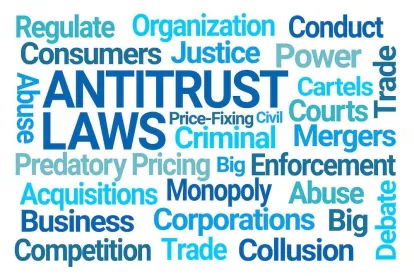Primary HSR filing threshold will be decreased to $92 million
The Federal Trade Commission has announced revisions to HSR Act and Clayton Act Section 8 thresholds, which are indexed annually to account for inflation. As is our annual practice, this alert identifies the adjustments that are likely to be the most relevant to our clients, and reiterates several important practice tips.
The Hart-Scott-Rodino Antitrust Improvements Act of 1976, commonly known as the HSR Act, requires parties to certain transactions to notify the Federal Trade Commission and Department of Justice, and to observe a waiting period prior to completing the transaction. The HSR Act enables antitrust regulators to review transactions, investigate and address potential competitive concerns prior to completion, and carries monetary penalties for failure to comply — adjusted for 2021to $43,792 per day.
Section 8 of the Clayton Act prohibits certain overlaps in officers or directors between competing companies to guard against anti-competitive coordination and information exchanges that can arise from simultaneous board membership. Thus, as a general rule a person cannot serve on the boards of two competing companies.
The FTC has announced the new thresholds that trigger the obligation to submit HSR filings for 2021, and, effective March 4, the basic HSR notification threshold will be decreased to $92.0 million.
Unless exempt, a person or entity that directly or indirectly acquires assets or voting securities (or interests in an unincorporated entity) in excess of the HSR threshold may be required to file notification under the Act and to observe the applicable waiting period before completing the transaction. Subsequent transactions involving the acquisition of additional interests in the same company typically are exempt from further notification — unless a subsequent notification threshold is exceeded.
Under the revised thresholds, transactions valued at $368 million or less will be subject to the HSR Act only if the parties also meet the size-of-person thresholds. The size-of-person threshold is generally met where a person with annual sales or total assets of $184 million makes an acquisition where the target or the target's parent has annual sales or total assets of $18.4 million, or vice-versa. Transactions valued at more than $368 million are subject to the HSR Act without regard to the size of the person, unless exempt.
Summary of the HSR Act's threshold adjustments:
|
SIZE-OF-TRANSACTION |
Current Thresholds |
New Thresholds |
|
|
Juristictional Threshold |
Basic Notification Threshold |
$94.0 million |
$92.0 million |
|
Subsequent Notification Thresholds |
$188.0 million |
$184.0 million |
|
|
$940.1 million |
$919.9 million |
||
|
25% (if value exceeds $1,880.2 million) |
25% (if value exceeds $1,839.8 million) |
||
|
50% (where value exceeds $94.0 million) |
50% (where value exceeds $92.0 million) |
||
|
SIZE-OF-PERSON |
Current Thresholds |
New Thresholds |
|
| Juristictional Threshold |
Size-of-Person Thresholds
|
$18.8 million |
$18.4 million |
|
$188.0 million |
$184.0 million |
||
|
Size-of-Person Inapplicable |
$376.0 million |
$368.0 million |
|
Filing Fees
The dollar amount of the filing fee payable to the Federal Trade Commission with HSR Act filings is not subject to annual indexing; however, the thresholds applicable to the statutory filing fees do adjust with indexing. The revised schedule of HSR filing fees will be as follows:
|
Transaction Size |
Filing Fee |
|
Greater than $92.0 million but less than $184.0 million |
$45,000 |
|
$184.0 million or greater but less than $919.9 million |
$125,000 |
|
$919.9 million or greater |
$280,000 |
Practice Tip 1 – Officers and Directors can have HSR Filing Obligations:
Consider HSR filing obligations in all types of transactions, including smaller transactions, minority investments, follow-on investments, joint ventures, asset acquisitions and exercises of warrants or options. HSR enforcement extends, for instance, to company executives acquiring stock in their employers. Under the rules, when a company employee or director acquires company stock that results in an aggregate holding that is valued above the HSR reporting threshold, filing obligations can arise. The most common form of "corrective filing" relates to this very scenario, so now is a good time to review executive holdings and employee stock ownership plans to make sure HSR notification triggers are properly accounted for to avoid violations.
Practice Tip 2 – Consider Incremental Acquisitions:
Also consider the current value of previously acquired minority positions to plan accordingly for potential HSR filing and waiting period requirements when participating in follow-on offerings and investments. Review minority holdings that may have appreciated above the HSR threshold and plan for future incremental purchases that may trip the initial or subsequent notification thresholds.
Practice Tip 3 – Patent Licensing Transactions May be Subject to HSR Reporting:
Always consider HSR reporting in patent licensing transactions, even where the up-front payments may be below the reporting threshold. The HSR valuation rules with respect to these types of transitions take numerous other factors into account, including the current fair market value of a hypothetical fully-paid ,royalty-free license.
Practice Tip 4 – Directorships in Competing Companies can create an Antitrust Violation — Revised Clayton Act Section 8 Thresholds:
Always consider Clayton Act Section 8 when installing board members of potentially competing portfolio companies that are not under common control. This is a good time to examine whether violations exist and to cure them, ideally within the one-year grace period.
Clayton Act Section 8 is particularly relevant for investment funds taking minority positions in competing companies and seeking board representation. Under the statute, no person, or representative of the same person or entity, is permitted to serve simultaneously as a director or officer of competing companies, but there are carve-outs and exceptions.
The prohibitions of Section 8 are limited to cases in which each of the companies has, under the revised thresholds, capital, surplus, and undivided profits of more than $37,382,000. Even where the threshold is met, however, the restrictions do not apply where the competitive sales of either company represents less than 2 percent of its total sales, or are less than $3,738,200; or where the competitive sales of each company represent less than 4 percent of its total sales. The statute also permits directors and officers whose appointments were not prohibited at the time of appointment to continue to serve for up to a year after the Section 8 thresholds are exceeded, thus the revised Clayton Act Section 8 thresholds can potentially eliminate an existing violation, which is not the case with the HSR threshold revisions.
Correct application of the HSR Act and Clayton Act Section 8 can be complex, and requires careful analysis.




 />i
/>i

